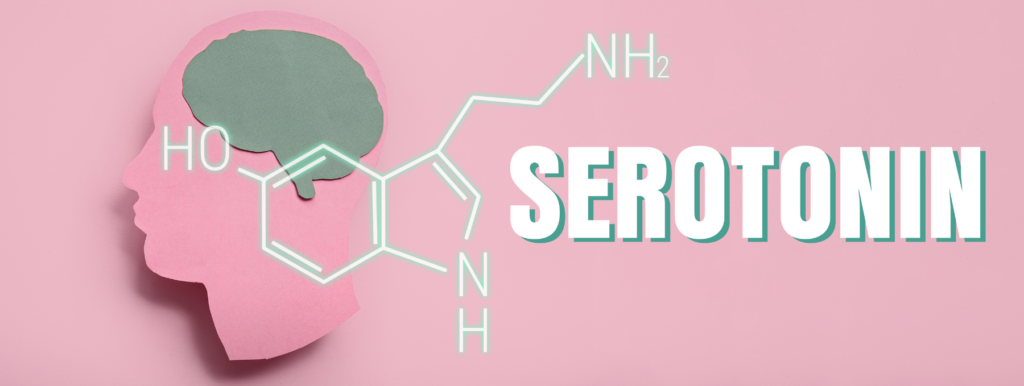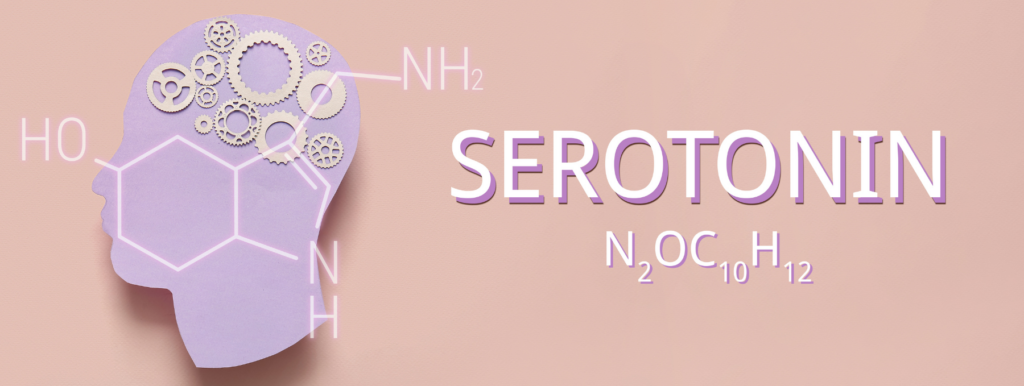Serotonin is a vital neurotransmitter that plays a crucial role in regulating mood, emotions and various bodily functions, including digestion, sleep and appetite. Often referred to as the “feel-good” neurotransmitter, serotonin significantly influences mental health, physical well-being and overall quality of life.
When there is a serotonin deficit, it can lead to a range of effects that can disrupt daily life and extend beyond mere mood fluctuations; they can manifest as physical symptoms, cognitive impairments and behavioral changes that affect relationships and overall functioning. Read on to learn more about the various emotional, physical and behavioral serotonin deficiency effects, as well as their long-term consequences and potential treatment options.
What is Serotonin Deficiency?
Serotonin deficiency occurs when the body does not produce enough serotonin or when serotonin levels are disrupted. This condition can stem from various factors, including genetics, diet, lifestyle and underlying health conditions. For instance, certain genetic predispositions may affect how serotonin is synthesized or utilized in the brain. Additionally, dietary factors, such as insufficient intake of tryptophan (the amino acid precursor to serotonin), can hinder serotonin production. Lifestyle choices, including lack of exercise and poor sleep hygiene, can also contribute to lower serotonin levels.
Understanding the causes of serotonin deficiency is essential for recognizing its effects and seeking appropriate treatment. When serotonin levels are disrupted, people may experience a range of symptoms that can significantly impact their emotional and physical health. By understanding the primary serotonin deficiency effects and identifying the contributing underlying factors, those with this condition can take proactive steps toward restoring balance and improving their overall well-being.
Emotional Serotonin Deficiency Effects
 When serotonin deficit occurs, it can cause a range of emotional effects. One of the most significant emotional serotonin deficiency effects is depression; those with serotonin deficiency may find themselves grappling with persistent feelings of sadness, hopelessness and a lack of interest in activities they once enjoyed.
When serotonin deficit occurs, it can cause a range of emotional effects. One of the most significant emotional serotonin deficiency effects is depression; those with serotonin deficiency may find themselves grappling with persistent feelings of sadness, hopelessness and a lack of interest in activities they once enjoyed.
This depression can manifest in various ways, including Major Depressive Disorder (MDD), which is a clinical diagnosis characterized by severe and prolonged depressive episodes. Another possible manifestation is dysthymia, a chronic form of depression that lasts for at least two years and often presents with less severe symptoms. The link between serotonin deficiency and depression is well-documented, with many antidepressant medications specifically targeting serotonin levels to alleviate these distressing symptoms.
In addition to depression, serotonin deficiency can also contribute to anxiety disorders. Those with serotonin deficiency may experience heightened feelings of worry, nervousness and fear that significantly interfere with daily functioning. Common anxiety disorders associated with serotonin deficiency include Generalized Anxiety Disorder (GAD), characterized by excessive worry about various aspects of life, and Panic Disorder, which involves recurrent panic attacks and intense fear of future attacks.
Another emotional effect of serotonin deficiency is irritability and mood swings. Those experiencing serotonin deficiency may find themselves more easily frustrated or angered, which can lead to significant emotional instability. This irritability can strain relationships and create challenges in social situations, making it difficult to maintain connections with others. The combination of depression, anxiety and irritability highlights the profound impact that serotonin deficiency can have on emotional well-being, underscoring the importance of recognizing these symptoms and seeking appropriate support and treatment.
Serotonin Deficiency Effects on the Body
Serotonin deficiency can also cause a variety of physical effects. Chronic fatigue is a prevalent physical effect of serotonin deficiency, and can leave sufferers feeling persistently tired and lacking the energy to engage in daily activities. This type of fatigue can manifest both mentally and physically, and can make it challenging to concentrate or perform tasks effectively. The overwhelming sense of tiredness can hinder productivity and diminish overall quality of life, creating a cycle of exhaustion that is difficult to break.
In addition to fatigue, serotonin deficiency can lead to significant sleep disturbances. Serotonin plays a vital role in regulating sleep patterns, thus a deficit can result in issues such as insomnia, which involves difficulty falling or staying asleep, and restless sleep, characterized by frequent awakenings during the night or non-restorative sleep. Sleep problems can exacerbate feelings of fatigue, further contributing to emotional instability and a decline in overall well-being.
Too little serotonin in the body can also cause notable changes in appetite. Some people may experience increased cravings for carbohydrates, while others may find themselves losing their appetite altogether. These fluctuations in eating habits can lead to weight changes, which can impact overall health and well-being. The interplay between serotonin levels, fatigue, sleep disturbances and appetite highlights the multifaceted nature of serotonin deficiency and its profound effects on physical health.
How Serotonin Deficiency Affects Behavior
Aside from the physical and emotional effects of serotonin deficiency, those experiencing this condition may also suffer from significant behavioral effects. Those with serotonin deficiency may become socially withdrawn, retreating from social interactions and activities. This withdrawal can be rooted in feelings of depression, anxiety or irritability, and can lead to self-isolation that exacerbates emotional distress and loneliness. The lack of social support that results from distancing oneself from friends and family can further deepen existing struggles, creating a cycle that can be difficult to escape.
In addition to social withdrawal, serotonin deficiency can impair cognitive function and make it difficult to concentrate. Those with serotonin deficiency may find it challenging to focus on tasks or make decisions, and can become easily distracted. This cognitive impairment can negatively impact work performance and daily responsibilities, making even simple tasks feel overwhelming. The inability to concentrate can lead to frustration and a sense of inadequacy, further compounding emotional serotonin deficiency effects.
A lack of serotonin can also result in decreased motivation to engage in daily activities or pursue personal goals. People suffering from serotonin deficiency may struggle to find the drive to participate in hobbies, exercise or even complete essential tasks. This decline in motivation can contribute to feelings of hopelessness and despair, as the inability to engage in fulfilling activities reinforces a negative self-image and a sense of stagnation. Together, these behavioral effects highlight the profound impact of serotonin deficiency on the ability to function and thrive in daily life.
Long-term Consequences of Serotonin Deficiency
 Serotonin deficiency effects can have significant long-term consequences on a person’s life, impacting mental health, relationships and overall well-being. One of the most profound effects is its impact on relationships. Emotional instability and social withdrawal associated with serotonin deficiency can strain connections with friends and family. Loved ones may struggle to understand the individual’s behavior, which can lead to frustration and misunderstandings. Over time, this strain can result in isolation and a lack of support, further exacerbating the condition and making recovery more challenging.
Serotonin deficiency effects can have significant long-term consequences on a person’s life, impacting mental health, relationships and overall well-being. One of the most profound effects is its impact on relationships. Emotional instability and social withdrawal associated with serotonin deficiency can strain connections with friends and family. Loved ones may struggle to understand the individual’s behavior, which can lead to frustration and misunderstandings. Over time, this strain can result in isolation and a lack of support, further exacerbating the condition and making recovery more challenging.
Additionally, cumulative serotonin deficiency effects can lead to reduced quality of life. Those with serotonin deficiency may find it increasingly difficult to enjoy activities, maintain relationships or achieve personal goals. This decline in overall well-being can create a cycle of negative emotions and behaviors that make it harder to break free from the grip of serotonin deficiency. As enjoyment in life diminishes, feelings of hopelessness and despair can take hold, further complicating the path to recovery.
Finally, chronic serotonin deficiency can increase the risk of developing other health issues. For instance, chronic stress and anxiety linked to serotonin deficiency can lead to cardiovascular issues, such as increased heart rate and blood pressure, raising the risk of heart disease. Additionally, serotonin plays a crucial role in regulating gut function, and a deficiency can result in gastrointestinal problems, including irritable bowel syndrome (IBS) or changes in bowel habits. Furthermore, those struggling with serotonin deficiency may turn to alcohol or drugs as a coping mechanism, which can lead to potential substance abuse problems. These long-term consequences underscore the importance of addressing serotonin deficiency to improve overall health and well-being.
Treatment Options for Serotonin Deficiency
Recognizing the various effects of serotonin deficiency is the first step toward seeking help. Fortunately, there are various treatment options available to help restore serotonin levels and alleviate symptoms. Consulting a healthcare professional is crucial for diagnosing and treating serotonin deficiency. Mental health professionals can conduct assessments and recommend appropriate treatment plans, which may include psychotherapy and medication.
Therapeutic Approaches
Therapeutic approaches such as cognitive-behavioral therapy (CBT) can help those with serotonin deficiency address negative thought patterns and develop effective coping strategies. Additionally, antidepressants, particularly selective serotonin reuptake inhibitors (SSRIs), are commonly prescribed to increase serotonin levels and alleviate symptoms of depression and anxiety. Monoamine oxidase inhibitors (MAOIs) are another class of medications that can be effective in treating serotonin deficiency by preventing the breakdown of serotonin in the brain.
Lifestyle Changes
In addition to professional treatment, making certain lifestyle changes can significantly impact serotonin levels and overall well-being. A balanced diet rich in tryptophan, an amino acid that helps produce serotonin, can support serotonin production. Foods such as turkey, eggs, nuts, seeds and dairy products are excellent sources of tryptophan. Taking supplements like 5-HTP (5-Hydroxytryptophan), which serves as a direct precursor to serotonin, can also be beneficial. Additionally, vitamin D and omega-3 fatty acids, found in fish oil, have been shown to support brain health and improve mood.
Physical Activity
Regular physical activity is also beneficial, as exercise has been shown to boost serotonin levels and improve mood; aiming for at least 30 minutes of moderate exercise most days of the week is recommended. Furthermore, prioritizing good sleep hygiene can help regulate serotonin levels. Establishing a consistent sleep schedule, creating a relaxing bedtime routine and limiting screen time before bed are effective strategies for improving sleep quality.
Building a Support Network
 Building a strong support network is essential for managing serotonin deficiency. Connecting with friends, family or support groups can provide emotional support and encouragement during challenging times. Sharing experiences and challenges with others can help people feel less isolated and more understood, fostering a sense of community and connection that is vital for recovery. Together, these treatment options and lifestyle changes can create a comprehensive approach to managing serotonin deficiency and enhancing overall well-being.
Building a strong support network is essential for managing serotonin deficiency. Connecting with friends, family or support groups can provide emotional support and encouragement during challenging times. Sharing experiences and challenges with others can help people feel less isolated and more understood, fostering a sense of community and connection that is vital for recovery. Together, these treatment options and lifestyle changes can create a comprehensive approach to managing serotonin deficiency and enhancing overall well-being.
Overcoming the Effects of Serotonin Deficiency
Serotonin deficiency can have profound effects on emotional, physical and behavioral well-being. From depression and anxiety to fatigue and social withdrawal, the impacts can disrupt daily life and lead to long-term consequences. However, recognizing serotonin deficiency effects is the first step toward seeking help and making positive changes.
With the right support, treatment and lifestyle adjustments, those suffering from serotonin deficiency can effectively manage this condition and improve their quality of life. If you are affected by serotonin deficiency, remember, you are not alone in this journey; support is available to help you navigate the challenges you are facing and emerge stronger. Prioritizing mental health and well-being is essential for cultivating resilience and once again finding joy in everyday life.




